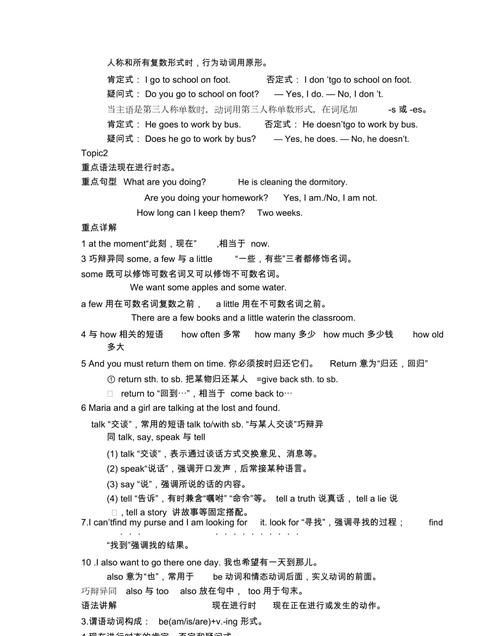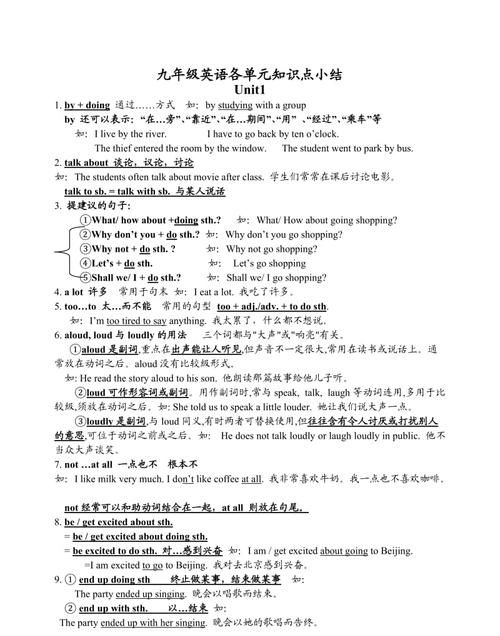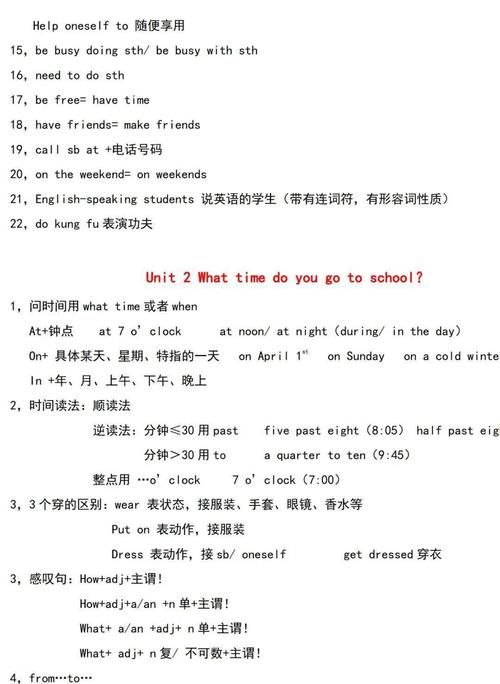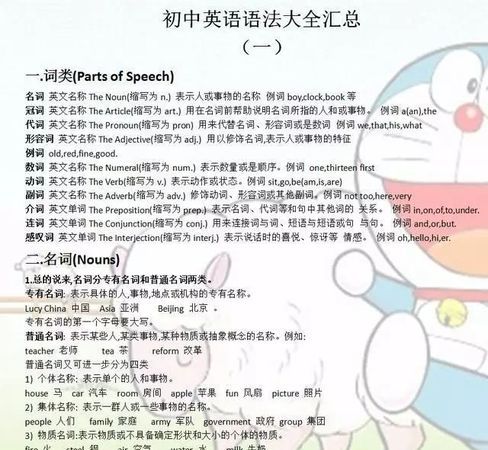本文目录
苏教版初中英语知识点总结归纳大全详解
下面我为大家整理了初中英语基本知识点归纳,希望对同学们期末复习有帮助,一起了解一下吧,供参考。
of所有格的用法
用于无生命的东西:the legs of the chair, the cover of the book, a map of the world , the story of a hero , the windows of the room , the title of the film
用于有生命的东西,尤其是有较长定语时:the classrooms of the first-year students
某些of所有格和‘s所有格可以互换。
the son of a poor peasant=a poor peasant‘s son一个贫农的儿子。
但有时含义却不相同,请比较下面的例子:
an old woman's story(一个老妇人讲自己的身世)。
the story of an old woman(别人讲一个老妇人的身世)。
不可数名词的记法
一、是没有复数的形式;(milk, milk, milk)
二、是作主语,谓语须用单;(The water is clean. The air is fresh. )
三、是其前不用a和an;(The work is hard to do. )
四、是修饰不用基数词;
五、是可用much、some、any、a lot of等修饰;(I want to drink some water.)
六、是表数量,计量名词加of。(There is a cup of tea on the table.)
到目前为止,教材里已经出现了好多不可数名词,假如你不能记住它们,请背诵下面的顺口溜:
食物,面包,肉,米饭;
(food,bread,meat,rice)
饮料,牛奶,桔汁,茶;
(drink,milk,orange,tea)
鱼,水,工作,空气;
(fish,water,work,air)
语言名词均为不可数英语,汉语,法语,日语.
(English,Chinese,French,Japanese)
形容词的常用句型
1.It's+形容词+of+sb.+动词不定式"某人(做某事)……",说明"人"的性质或特征。
常用形容词有:good,kind,nice,polite, clever, foolish, lazy, careful, careless, right, wrong等
It's very kind of you to help me.
It's foolish of you to make such mistake.
2.It's+形容词+for+sb.+动词不定式 "做某事对某人来说……", 说明动词不定式的性质、特征。
常用形容词有:difficult, easy, hard, dangerous, safe, useful, pleasant, interesting, impossible等。
It is impossible for a child to answer the question. 小孩子不可能回答出这个问题。
It is dangerous for you to swim alone. 你自己一个人去游泳很危险。
3. 主语+be动词 +形容词+动词不定式 这一句型常用表示感情、情绪,以及表示能力和意志的形容词,
如: glad, pleased, sorry, sad, thankful 或ready, able, sure, certain等。
I'm very sorry to hear the news.
常见形容词用法比较
1.elder和older
①elder为"年长的",只指人,用来比较年龄长幼,尤指兄弟姐妹的长幼关系,它只能用在名词前作定语,不能用于than引导的比较状语从句中。如: Jordan has two elder brothers and an elder and a younger sister.
②older为"年龄较大的,较老的,较旧的",可指人,也可指物,作定语或表语,能用在than引导的比较状语从句中。 My elder brother is 7 years older than my younger sister.
2.good和well
good和well都表示"好"。通常,作定语或表语时用good,作状语时用well;表示"身体好的"用well.
Doing sports is good for us. 做运动对我们有益。(作表语)
Sandy dances well and she is a good dancer. 桑迪舞跳得好,她是个出色的舞者。(well作状语,good作定语)
---How are you---I am very well. (作表语,表示"身体好的")
3.huge, big, large,和great
1)huge强调尺寸、体积"庞大"(指体积时,比large, great所指的体积大),容量和数量"巨大",不强调重量。
About ten years ago scientists from the United States found that the large object caused a huge hole in Mexico.
2)big最通俗、常用,强调比正常程度、范围及规模的标准大,修饰人、物或数量。反义词是little或small
My best friend is Xiao Li, but last week in school we had a big fight.
3)large强调远远超过标准的"大",可指数量、容量、体积和面积,比big正式,反义词是small.
So it is proved that the large object had a close relation with the death of dinosaurs and other animals.
4)great通常指抽象的事物。可表数量、距离和程度,修饰人时,意为"伟大的"。
This is a great chance that many people do not have.
一般将来时的用法
用法:表示将要发生的事情或存在的事情。
构成:主语+will/shall(第一人称)+动词原形。
表示未经事先思考的意图,表明说话者的观点、主观意识。
主语+be going to+动词原形。
表示已经决定或安排要做的事,客观迹象表明必然或可能发生的事,表示自然现象。
主语+be to+动词原形。
表示计划中约定的或按职责、义务必须去做或即将发生的动作。
主语+be about to+动词原形(常与when连用)。
表示主观要做的事,常与when连用。

初中英语语法知识点归纳
英语语法一直以来都是很多初中生头疼的内容,由于英语语法知识比较复杂,很多学生都学不好这部分的知识。下面是我为大家整理的关于初中英语语法知识归纳,希望对您有所帮助。欢迎大家阅读参考学习!
初中英语语法知识归纳
名词的所有格:表所有关系
两种表示法:’s和of
1)用and连接两个并列的单数名词表示共有关系时,只在最后一个名词后加’s;表示分别拥有各自的物品时,两个名词都要加’s.
eg: Mary and her sister’s bedroom 玛丽和她妹妹的房间 Tom’s and Mary’s bags 汤姆的和玛丽的包
2)以s结尾的名词,在s后加’, 不以s结尾的加’s
eg: Teachers’ Day Children’s Day
3)双重所有格,形式:of+名词所有格;of+名词性物主代词
eg:He is a friend of my brother’s. Is she a daughter of yours ?
辨析: a picture of her mother’s 她妈妈的一张照片(强调照片是她妈妈的,但照片上的人不一定是她妈妈)
a picture of her mother 她妈妈的照片(强调照片上的人是她妈妈) 4)表示店铺、医院、诊所、住宅等名称时,常用名词后加上’s代表全称 at the doctor’s 在医院的候诊室
5)在some, any, every和one, boby结合起来的复合名词后加’s
someone’s book 某人的书, somebody else’s pencil 其他人的铅笔
6)表示时间,距离,国家,城市等无生命的名词,也可以在词尾加’s或’构成所有格。
意:名词+of+名词名词是有生命的,我们就用’s结构来表示所有关系。如果名词所表示的事物是无生命的,我们就要用名词+of+名词的结构来表示所有关系.如: the legs of the desk,the door of the room
但在表示名词所有格时,’s结构也常可转换成of结构。有些表示时间,距离、国家、城市等无生命的东西的名词,也可以加’s来构成所有格.如: ten minutes' walk,today's newspaper
初中英语必背语法知识
1、be late for„. „„迟到
Don’t be late for school.不要上学迟到。
2、play + 球类名词:打/踢„„球(注意: 球类运动 不用冠词)
play +the+ 乐器(西洋)
playping-pong/basketball/volleyball/tennis/soccer
3、sound
1)连系动词,“听起来”,后接形容词作表语。
That story sounds very interesting.那 故事 听起来很有趣。
2)名词“声音”(泛指自然界中的各种声音)。
The sound is too loud.声音太大了。
4、every day 每天
She plays sports every day. 她每天都做运动。
everyday日常的 everyday English 日常英语
5.after class 下课后 after school 放学后
6. 辨析interesting与interested
1) interesting可作表语,指某人/事/物本身有趣;也可作定语修饰人或物
① The book is interesting.这书很有趣。 (作表语)
②I have an interestingbook.我有本有趣的书。(作定语)
2) interested用于be/get/become interested in„(对„„感兴趣)这一结构中。
He is interested inplaying football.他对踢 足球 感兴趣。
7、like 喜欢
1)like sb. / sth.喜欢某人/某物
2) like to do sth.喜欢/想要做某事(表一次性或特指的某一具体的动作)
3) like doing sth喜欢做某事(表习惯性的动作或 爱好 )
①我喜欢每天打 篮球 。I like playing basketballevery day.
②今天很冷,我喜欢呆在家里。Todayis cold, I like to stay at home.
初中英语语法知识
一、陈述句
陈述句是陈述一个事实或者说话人的看法的,陈述句分为肯定句和否定句。陈述句句末用句号,朗读时用降调。
1、肯定句的基本结构为:主+谓 He went to London to pass his holiday.
2、否定句的表达方式
(1)主语+be+not+表语 He is not a teacher.
(2)主语+助动词/情态动词+not+谓语动词+其他 I don't think you are right. He hasn't yet paid the money. (他尚未付钱。)
(3)使用“not”以外的否定词:
(a)副词:never, seldom, hardly, little, neither等。She seldom comes to see me. (她不常来看我。)
(b)形容词:no, few, little等 He has few friends in Hong Kong. (他在香港几乎没有朋友。)
(c)代词:nothing, nobody, none等。I found nobody about computer. (在那栋房子里我没看到任何人。)
二、疑问句
疑问句的主要交际功能是提出问题,询问情况。分为一般疑问句、选择疑问句、特殊疑问句和反意疑问句。
1、一般疑问句通常用来询问一件事情是否属实。答句通常是“yes或no”。 句型一:Be +主语+ …?Are these books on the desk?这些书在桌子上吗?
句型二:Do / Does / Did + 主语 +谓语+…?Do you like English?你喜欢英语吗? 句型三:情态动词 + 主语 + 谓语 +…?
Must I finish my homework now?我必须现在完成我的家庭作业吗?
句型四:Have / Has + 主语 + 过去分词+…?
Have you heard from him? 你收到他的来信吗?
另外,还有以be动词、助动词或情态动词的否定缩写形式开头的一般疑问句,这种 句子 一般表示请求、惊讶和对事物的看法等,回答时所用的yes和no表达的意思和汉语的习惯不同。例如:——Isn't he tall?难道他不高吗?
—— Yes, he is.不,他很高。
2、特殊疑问句以疑问词开头,对句中某一成分提问的句子叫特殊疑问句。常用的疑问词有:what 、who 、whose 、which、 when、 where、 how 、why等。例如: who is singing in the room?
what class are you in﹖
相关 文章 :
1. 初中英语语法总结
2. 初中英语五种语法知识点总结
3. 初中英语知识点总结归纳
4. whistle的用法和短语例句
5. 初中英语语法八大时态总结

人教版初二英语语法知识点归纳总结
初中是学习英语的重要阶段,想要学好在初中学好英语需要对所学的知识进行归纳总结以便复习。以下是我分享给大家的初一初二英语语法知识点,希望可以帮到你!
初一初二英语语法知识点
1. The Simple Present Tense 一般现在时
一般现在时最容易出现错误的地方是在第三人称单数形式上。
everyone,everybody,no one,nobody,someone,somebody,nothing,everything,anything,以及none,each,every引导的名词或代词作主语时,谓语动词要用单数形式。
例如:
Everyone is here. 大家都在这里。
No one knows his name. 没有人知道他的名字。
2. The Present Continuous Tense 现在进行时
现在进行时最容易出现错误的地方在动词的现在分词形式上,我们在复习的时候要特别注意不规则动词的变化形式。
例如:
swimming,beginning,putting,taking,buying。
3. The Simple Future Tense 一般将来时
1) 一般将来时表示将来某个时间要发生的动作或存在的状态,也表示将来经常或反复发生的动作,常
与表示将来的时间状语连用,如:tomorrow,next week,next year等。其构成为"助动词
will +动词原形"。
2) be going to 用于一般将来时态中,表示"打算,准备,将要……"。动词be 要随着主语的人称变
化而变化,后面要用动词的原形。
例如:
He is going to walk to school.
I am going to buy a new CD.
They are going to wash the dishes after dinner.
3) go,come,leave这三个词一般不放在be going to 的后面,这三个动词如果要表示将来时,要直接
用be+ going/ coming/ leaving 的形式。
例如:
They are leaving Beijing tonight.
The teacher is coming.
We are going to the Great Wall next Saturday.
4.The Simple Past Tense一般过去时
一般过去时最明显的现象就是常由表达过去时间的副词或副词短语来修饰它。
这些常用于修饰一般过去时的副词有:yesterday,yesterday morning(afternoon,evening),just now(刚才),before(以前),then (at that time)(当时),last + 时间 (如 last week,month,year,Monday,… January,… spring,…,etc.),that + 时间 (如 that day,afternoon,summer,…,etc.),时间 + ago (如 a few minutes ago,two weeks ago,years ago,… etc.)
5.动词的常用搭配形式
let sb. do sth. 让某人做某事
It's time to do sth. 到了该做某事的时间。
want to do sth. 想做某事
Would you like to do sth?你愿意做某事吗?
help sb. (to) do sth. 帮助某人做某事
like doing sth 喜欢做某事
stop doing sth. 别做……了 stop to do sth. 停下来去做某事
finish doing sth. 结束做某事
Why not do sth. 为什么不……?
had better do sth 最好做某事
enjoy doing sth. 喜欢做某事
What about doing sth? 做……怎么样?
need to do sth. 需要做某事
Thank you for doing sth. 谢谢你……
tell sb. to do sth. 告诉某人做某事
be busy doing sth. 忙着做某事
ask sb. to do sth. 请某人做某事 / 要求某人做某事
初中英语句型归纳
1 see,hear,notice,find,feel,listen to,look at (感官动词)+ do eg: I like watching monkeys jump.
2 (比较级 and 比较级) 表示越来越……
3 a piece of cake =easy 小菜一碟(容易) 补:a place of interest 名胜
4 agree with sb. 赞成某人
5 all kinds of 各种各样 a kind of 一种/样
6 all over the world = the whole world 整个世界
7 along with 同……一道,伴随……
eg : I will go along with you 我将和你一起去
The students planted trees along with their teachers. 学生同老师们一起种树。
8 As soon as 一……就……
9 as you can see 你是知道的
10 ask for ……求助向……要……(直接接想要的东西)
eg: ask you for my book
11 ask sb. for sth. 向某人什么
12 ask sb. to do sth. 询问某人某事 ask sb. not to do sth. 叫某人不要做某事
13 at the age of 在……岁时
eg:I am sixteen. I am at the age of sixteen.
14 at the beginning of … ……的起初;……的开始
15 at the end of +地点/+时间最后;尽头;末尾
eg : At the end of the day
16 at this time of year 在每年的这个时候补:at least 至少
17 be /feel confident of sth. /that clause + 从句感觉/对什么有信心,自信
eg: I am / feel confident of my spoken English I feel that I can pass the test
18 be + doing 表:1 现在进行时 2 将来时
19 be able to (+ v.原) = can (+ v.原) 能够……
eg: She is able to sing. She can sing. 补:base on 以……(为)根据
20 be able to do sth. 能够干什么 eg: She is able to sing.
21 be afraid to do (of sth. 恐惧,害怕……
eg: I'm afraed to go out at night. I'm afraid of dog.
22 be allowed to do 被允许做什么
eg: I'm allowed to watch TV. 我被允许看电视。I should be allowed to watch TV. 我应该被允许看电视。
23 be angry with sb. 生某人的气
eg: Don't be angry with me.
24 be angry with (at) sb. for doing sth. 为什么而生某人的气
25 be as … 原级 … as 和什么一样
eg: She is as tall as me. 她和我一样高。
26 be ashamed to
27 be away from 远离
28 be away from 从……离开
29 be bad for 对什么有害
eg: Reading books in the sun is bad for your eyes. 在太阳下看书对你的眼睛不好。
30 be born 出生于
31 be busy doing sth. 忙于做什么事 be busy with sth. 忙于……
32 be careful 当心;小心 be close to … 离……很近
33 be different from … 和……不一样
34 be famous for 以……著名
35 be friendly to sb 对某人友好
36 be from = come from 来自
eg:He is from Bejing. He comes from Bejing.Is he from Bejing? Does he come from Bejing?
37 be full of 装满……的 be filled with 充满
eg: the glass is full of water the glass is filled with water
38 be glad + to do/从句做某事很高兴
39 be going to + v.(原) 打算,计划,准备……
40 be good at(+ doing) = do well in 在某方面善长, 善于……
41 be good for 对什么有好处
eg: Reading aloud is good for your English.
42 be happy to do 很高兴做某事
43 be helpful to sb. 对某人有好处
eg: Reading aloud is helpful to you. 大声朗读对你有好处。
Exercising is helpful to your bady. 锻炼对你的身体有好处。
44 be in good health 身体健康
45 be in trouble 处于困难中
eg : She is in trouble They are in tronble
46 be interested in 对某方面感兴趣
47 be late for = come late to 迟到
eg: Be late for class 上课迟到
48 be like 像……
eg: I'm like my mother.
49 be mad at 生某人的气
50 be made from 由……制成(制成以后看不见原材料) 补:be made in 在……生产或制造
51 be made of 由……制成(制成以后还看得见原材料)
52 be not sure 表不确定
53 be on a visit to 参观
54 be popular with sb. 受某人欢迎补:be please with 对…感到满意
55 be quiet 安静
56 be short for 表……的缩写
eg: 陶 is short for 陶俊杰
57 be sick in bed 生病在床
58 be sorry to do sth. be sorry for sb.
eg: I am sorry for you.
59 be sorry to hear that
60 be sorry to trouble sb.
eg: I am sorry to trouble you.
初中英语学习方法
1.词汇过关。
无单词,不英语!记单词时首先要会读,一般会读就会写,把读音和拼写合二为一,轻松背单词。记得背新单词时先复习一下上次背过的,常反复常巩固才能变成长久记忆。
2.课文过关。
朗读课文.背诵课文是培养语感.消化巩固语法和词汇的有效途径!每天坚持8--10分钟朗读背诵.日积月累.坚持不懈!
3.语法过关。
语法是规则,按规则出牌,练习分分钟搞定!语法就如数学公式,背--例句--练习!一定要养成多次反复看笔记,记规则的学习习惯。
4.操练过关。
练习,作业是检验学习效果的必要手段。学会思考.学会分析.及时纠错.反复练习.逐步提高。
5.坚持阅读 课外拓展 锦上添花
平时的练习,阅读中遇到生词.短语.好句要善于积累。课外积累本是你超越对手的好帮手!
猜你喜欢:
1. 人教版初中英语知识点总结
2. 八年级英语知识点总结
3. 英语必考知识点归纳
4. 英语语法总结大全
5. 八年级上册英语知识点总结

初三英语知识点归纳以及重点词汇
语数英最为三门主课,看起来毫不相干,但三科的 学习 方法 其实基本都是一样的,数学记公式,语文记古诗,英语记单词。 学习英语 ,需要把陌生的单词片语和句型语法不断的熟悉和熟练。下面是我给大家整理的一些初三英语知识点的学习资料,希望对大家有所帮助。
仁爱版初三英语知识点 总结
【一般将来时】
表示将要发生的动作或存在的状态,常与表示将来时间状语如 next year,tomorrow等连用。注意:在Will you …?问句中,回答必须是 Yes,I will.或 No,I won't而不能用Yes,I shall. No, I shan't.来回答过去将来时:过去将来时不可以单独使用,它一般在宾语从句中作间接引语,表示从过去某一时间看来将要发生的动作或存在的状态。如:They told me that they would go to work in Guangdong.
【现在完成时】
顾名思义,现在完成时表示的是已经完成的动作,但动作造成的影响还在,常被just,already,yet 等副词修饰。如:He has already gone to Tianjin. 对现在造成的影响是他已经不在这儿了。现在完成时还可用来表示过去发生的动作一直延续到现在,常带有for或since等表示一段时间的状语。如:Mr Wang has lived here since 1983.表示说话前发生过一次或多次的动作,我们常用"过"来表示,常带有twice, once, ever, never等时间状语。如:I've never seen that film.
【过去完成时】
我们可以用"过去的过去"来概括过去完成时,表示过去某一时刻或某一动作之前已经完成了的动作,通常与by,before等构成的 短语 或when, before, after引导的从句连用。也可表示过去某一时间开始,一直延续到过去另一时间的动作,常和for或since构成的时间状语连用。用法和现在完成时大致相同,只不过又向前推了一个时态。
英语初三重点单词知识点人教版
talk to sb 和某人交谈
give sb sth/give sth to sb 给某人某物
police station 警察局
school play 校园剧
go out 出去
ask sb sth 问某人某事
get sth from sb 从某人处得到某物
do homework 做家庭作业
watch TV 看电视
eat/have dinner 吃晚饭
talk on the phone 打电话
TV show 电视节目
wait for 等待
talk about 谈论
play basketball 打 篮球
at school 在学校
read books 看书
not bad 不错
take photos 拍照
look cool 看上去很酷
have a good time 玩得开心
thank sb for doing sth 感谢某人做了某事
play computer games 打电脑游戏
pretty good 好极了
play beach volleyball 打沙滩 排球
look for 寻找
lie on the beach 躺在沙滩上
short/long hair 短/长发
curly/straight hair 卷/直发
medium build/height 中等身材/个子
look like 看起来像
the captain of… …的队长/首领
英语初三重点单词知识点
play chess 下棋
would like 想要
green tea 绿茶
countable noun 可数名词
uncountable noun 不可数名词
phone number 电话号码
as well as 也
ice cream 冰淇淋
orange juice 桔汁
what size 什么型号/尺寸
what kind of 什么种类
have a party 举行晚会
play the guitar 弹吉他
stay at home 呆在家里
play tennis 打 网球
play soccer 踢 足球
do some reading 阅读
clean one’s room 打扫房间
go for a walk 去散步
middle school 中学
go shopping 去购物
talk show (电视,广播的)访谈节目
go to the beach 去海滩
practice English 练习英语
study for the test 准备测试
初三英语知识点归纳相关 文章 :
★ 初三英语重点知识点归纳总结
★ 初三英语基础知识点总结整理
★ 初三英语知识点大总结
★ 最新九年级英语语法知识点总结大全
★ 九年级英语语法知识点整理归纳
★ 初三英语九个语法知识点
★ 初三上册英语知识点归纳
★ 初中英语知识点总结归纳3篇

以上就是关于初中英语公式知识点大全 ,苏教版初中英语知识点总结归纳大全详解的全部内容,以及初中英语公式知识点大全 的相关内容,希望能够帮到您。

